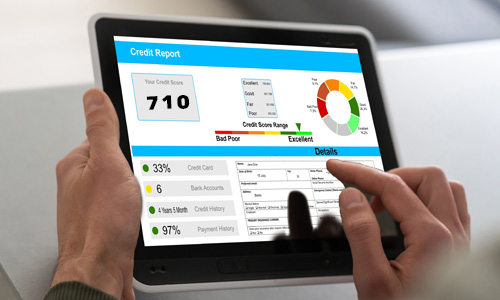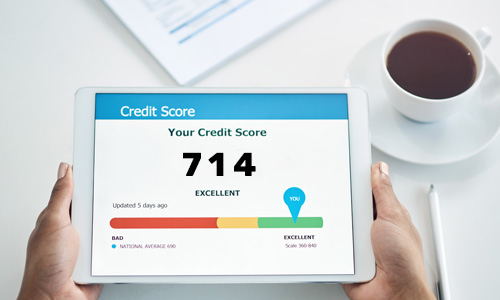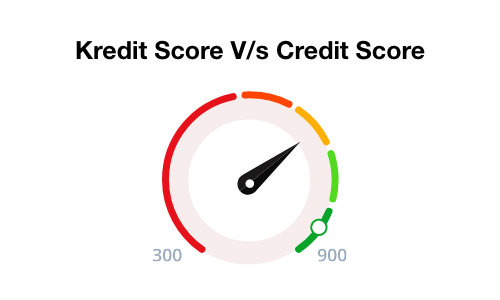Understanding Credit Score Rating Scale in the UAE
Your credit score is examined by a majority of financial institutions when deciding on your application for most finance products – loans, credit cards, bank accounts, and more. To ensure a good credit score in UAE and easily get your preferred service, it is necessary to first understand how the credit score rating functions in the UAE.
Go through this article for an in-depth insight into the credit score rating scale as well as the fundamentals of credit ratings, the difference between credit rating and credit score, and factors that influence credit score rating.
Credit Score: An Overview
A credit score, as discussed earlier, is one of the key factors considered by financial institutions across the UAE to evaluate the creditworthiness of an individual or a company. With the help of a credit score, banks estimate if the applicant is sufficiently equipped with funds and the financial acumen to get a loan or a new credit card. The credit score is produced by the Al Etihad Credit Bureau in the UAE.
If the provider institution finds that the credit score is low, it will either reject the application or approve it at high fees and charges. This is done to minimise the risk posed to the bank, as individuals with low credit scores pose high risk in terms of payment of the loan instalments or dues and bills.
In the UAE, the credit score ranges between 300 and 900. Once you are aware of your credit score, you will be capable of evaluating whether you are qualified enough for a loan or a new credit card. Moreover, this also gives you an opportunity to improve your credit rating if it is low.
Maintaining a good credit score in UAE is of utmost importance, with a good credit rating enhancing the probability of approval for credit cards, loans, and others. On the other hand, you can face numerous barriers if your credit score rating is low.
What is Credit Score Rating Scale?
The Al Etihad Credit Bureau regulates a credit score rating scale based on which the grading of the credit score can be assessed, with a certain credit score representing a star rating. The credit score rating is rated between 1-5 stars whereas ratings between 4 and 5 stars are considered good.

What is the Difference Between Credit Rating and Credit Score?
While credit rating and credit score are often used interchangeably, both the terms are distinct. A credit score is expressed in numbers, whereas a credit rating is indicated in stars. The parameters for both credit rate and score are decided by the AECB, i.e., the Al Etihad Credit Bureau.
Credit Score Ratings Chart
You can refer to the following chart to find out how are credit scores rated based on the range of credit scores in UAE. The 1 and 2-star ratings generally denote that the credit score is below average and inadequate for new loan and credit card requests. On the other hand, a 3-star rating represents an average credit rating whereas 4 and 5 stars indicate excellent credit scores.
|
Range of Credit Score |
Credit Score Rating |
|---|---|
|
300 - 400 |
1 Star |
|
401-595 |
2 Stars |
|
596-680 |
3 Stars |
|
681-720 |
4 Stars |
|
721-900 |
5 Stars |
How to Enhance Your Credit Score Rating?
To boost your credit score and keep up with a good credit rating, you can implement the following steps -
Repay Monthly Instalments On Time:
One of the most essential aspects in the determination of credit score is the repayment of debts (if any). By clearing out your monthly instalments on time, you are perceived as a responsible borrower, which leads to an improvement in your credit score. Thus, you should always make sure that you complete your down payments and other instalments on time.
Complete the Bill Payments Punctually:
Besides credit dues and loan instalments, your bill payment activities are also monitored to determine your credit score in UAE. Whether it is a utility bill payment or any other, it is highly advisable to complete your payment every month when your bill cycle ends.
Regulate your Credit Card Usage:
When purchasing a credit card, you must have a proper guide on how to use it as improper utilisation of the credit card can result in a bad credit rating. So while you can utilise these plastic cards as much as possible, the transactions must be made carefully while keeping the card limits in mind.
Take Extra Care with Multiple Credit Cards:
Having several credit cards doesn’t directly impact your credit score. However, failing to manage them properly can reduce your credit score considerably as the effects will be greater owing to the number of cards. With multiple cards, it could often be difficult to monitor your payments. Consequently, you should be careful if you operate more than one credit card.
Check Credit Score in a Limit:
While it is better to stay updated with your current credit score, you should avoid checking your credit rating or score repeatedly as even that can affect your credit report.
Avoid Multiple Loan and Credit Card Applications:
Submitting multiple requests for a loan or a credit card in a short period can have a negative impact on the credit score. In fact, the credit report also comprises information on how many times you have requested the same. Thus, you should avoid applying for multiple credit cards or loans at a time to keep your credit score intact.

Who Issues Credit Score Rating in the UAE?
As mentioned earlier, the Al Etihad Credit Bureau authorises credit scores for all individuals and organisations across the UAE. The institution gathers all the relevant information from banks, insurance companies, and government agencies to conduct an accurate evaluation of the credit score. It should be noted that the AECB may assess your credit card actions for the previous 5 years.
Every time you submit a request for generating a credit score and credit report, the AECB charges an amount for the same. The institution then sends your documents to your registered email address, usually within 8 hours of completing the payment.
To produce the credit score of an organisation, the AECB asks for an amount of AED 157.50 including taxes. Individuals, on the other hand, are required to pay AED 84 to know their credit score rating. With the mentioned charges, both the credit scores and credit reports can be accessed.
If you suspect an error in your credit score, you can send a request to have the score re-assessed. However, prior to that, you should make sure to check your credit report thoroughly and validate whether all the data mentioned in the report is correct or not.
How to Receive Your Credit Score and Credit Report?
You must follow a few steps to get your credit score -
Download and install the AECB Credit Report app
If you created an account earlier, sign in to it. Otherwise, complete the registration process by scanning your Emirates ID.
Select either of the options - Score Only or Report with Score
Once you choose an option, complete the payment process for the same
Wait for a few hours to have the requisite documents sent to your registered email address.
Key Takeaways
With the informational guide on the credit score rating scale given above, one can have a better understanding of these ratings and scores which will have a major role to play regarding their finances. You can indeed maintain a good credit score rating easily by following the steps discussed in the article like timely bill payments, monthly instalment payments, checking your credit score regularly (in a limit), and so on. You can always aim for a credit score rating above 3 stars, i.e., in the range of 680 and 900 to have easy approvals at better rates.
Moreover, as mentioned earlier, the AECB charges a certain amount to produce your credit score. With Policybazaar UAE, however, you can verify your credit score for free! For this, you can simply continue on policybazaar.ae and move to the credit card section where you will find an option to check your credit score. Provide all the necessary details and get your credit score for free.
Find below the answers to the frequent questions asked regarding credit score ratings in the UAE.
FAQs
Your credit rating would be 3 stars if your credit score ranges between 596-680.
You can install the CreditReport app and login to your account. Next, you will have to specify whether you want only your credit score or a credit report along with it. Finally, you can make the payment and receive your score/report online.
AECB considers a number of factors to assess your credit score and ratings like bill payments, debt loan repayment, credit card utilisation, applications for new credit cards or loans, the number of times that you have checked your credit score, and more.
In the UAE, the Al Etihad Credit bureau is responsible for determining your credit score and rating.
Yes, the AECB charges a fee of AED 84 to generate credit scores and reports for individuals. On the other hand, companies are required to pay AED 157.50 for the same. Keep in mind that you can check your credit score for free in the UAE with Policybazaar UAE.
| Credit Score for different types of Loan | |||
|---|---|---|---|
| Credit Score for Personal Loan | Credit Score for House Loan | Credit Score for Car Loan | Credit Score for Student Loan |

More From Credit Score
- Recent Articles
- Popular Articles











